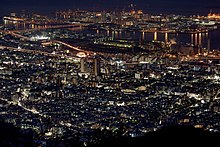Kobe, Hyōgo
- For the basketball player, see Kobe Bryant.



| Kobe, Hyōgo | |||||
| Japanese name | |||||
|---|---|---|---|---|---|
| Hiragana | こうべ | ||||
| Katakana | コーベ | ||||
| Kyūjitai | 神戶 | ||||
| Shinjitai | 神戸 | ||||
| |||||
Kobe (Japanese: 神戸市; -shi) is a city in the Kansai region of Japan on the island of Honshu. It is the capital city of Hyōgo Prefecture.[1]
Kobe is an important port city in the Kansai district of Western Japan. It is near the cities of Osaka and Kyoto. Its population is around 1.53 million people as of 2008.
Kobe is next to the Seto Inland Sea. Its northern part, including the Rokko mountain, is hilly. A ropeway runs from the Rokko district in its southern area through Rokko mountain to the Arima Spa. Transportation includes, the Shinkansen train service, highways and roads along the coast. Many cargo trucks and tankers use the port. There is a ferry between Shanghai and Kobe periodically.
History
[change | change source]Early history
[change | change source]Already in the late 12th century powerful leader Taira no Kiyomori moved the capital of Japan from Kyoto to Fukuwara, nowadays the Fukuwara district of Japan. He planned for it to serve as a trade and political center of Japan. Kiyomori relied his political influence on the trade between Japan and China. But his plan failed and Kobe stayed a small village during a long time.
Later history
[change | change source]The area of Kobe was expanded and today it includes Mount Maya, Sumaura Park, Sumaike park with a good spa and the famous Arima spa. Arima spa is one of oldest spas in Japan, whose earliest record is found already in Nihonshoki. Kobe is also famous for its Kobe beef, a very expensive meat delicacy.
Modern foundation
[change | change source]Kobe was founded in 1868 as a port for serving foreign ships. In those days most ports in Japan were closed to foreigners. Many foreigners lived in Kobe, including: westerners, Chinese, Jews, and Indians. Kobe has one of the more important Chinatowns in Japan. People can find a synagogue and many Christian churches, too. Kobe is similar to Yokohama as a place from where modern international culture was introduced into Japan.
Earthquake
[change | change source]On January 17, 1995 a very powerful earthquake hit the city. Earthquakes are more common in other parts of Japan, but not in Kansai so this earthquake was a surprise for everyone. 6,434 people were killed in Kobe and its neighboring cities, and many more were injured. Many of the buildings were destroyed.
Industry
[change | change source]The northern area of Kobe is an industrial area. There are many factories. Sake production in Nada district has been known from the Edo period. Nagata district in the southwest area of Kobe was a center of shoe production in Japan but production suffered because of destruction caused by the Earthquake.
Related pages
[change | change source]
References
[change | change source]Other websites
[change | change source] Geographic data related to Kobe, Hyōgo at OpenStreetMap
Geographic data related to Kobe, Hyōgo at OpenStreetMap

